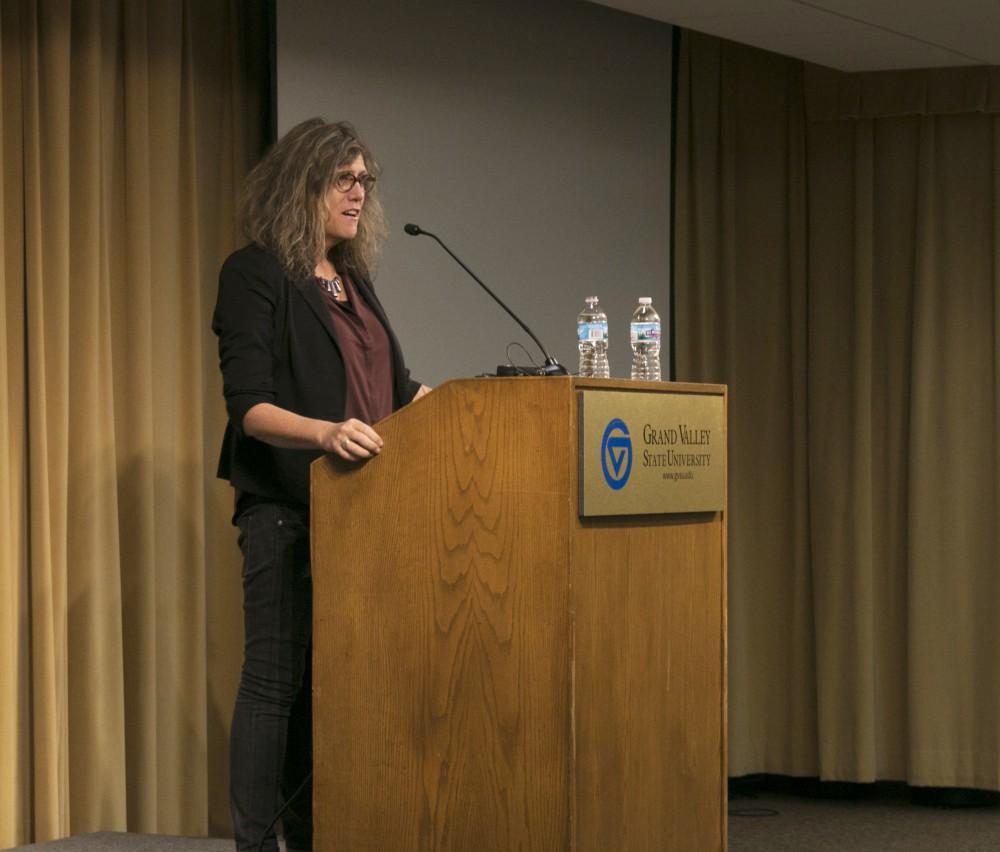GVSU observes Transgender Day of Remembrance

GVL/Hannah Zajac– Transgender Day of Remembrance with keynote speaker Dr. Susan Stryker in Kirkhoff on Monday 13 Nov 2017.
Nov 16, 2017
Grand Valley State University celebrated Transgender Day of Remembrance on Monday, Nov. 13. To highlight the national holiday, Susan Stryker was brought in by the Milton E. Ford LGBT Resource Center to give a keynote lecture on transgender issues and history.
Stryker, whose lecture began at 4 p.m., was introduced by assistant professor Cael Keegan of the liberal studies and women, gender and sexuality studies departments. Having known Stryker before her visit to GVSU, Keegan was a natural candidate to give her introduction.
Keegan said he was greatly influenced by Stryker’s work and was grateful for her role as a mentor in his life.
“It’s not often that you’re given the opportunity to introduce someone without whose work your own would not exist,” Keegan said. “Susan’s work and mentorship has not only been invaluable to me but has been the very precondition for my intellectual life.”
Highlighting the meaning and reason behind Transgender Day of Remembrance, Keegan spoke in his introduction about the role memory plays in remembering transgender lives that were lost too early.
“A remembrance is an opportunity to think carefully about the work of memory and what it can do—how we might want to use it, change it, share in it,” Keegan said. “To reorganize our collective consciousness and rearrange our public affects.”
In addition to speaking about the role of memory, Keegan said Transgender Day of Remembrance can also be a space for theorizing what our country and world would look like if transgender people were not lost at the rate in which they currently are.
“Transgender Day of Remembrance is a time during which we traditionally mark the premature loss of transgender lives due to violence,” he said. “In this context, a remembrance is a time we set aside to consider what has gone missing and what our world might be like without such empty spaces.”
In his introduction of Stryker, Keegan said her work has made it possible for himself and other transgender people to both understand and think critically about their culture and history, which can often by erased by society.
“Dr. Stryker has made enormous contributions to uncovering, documenting, theorizing and representing transgender histories and cultures in a manner that has made my own life and the lives of transgender people more possible to sustain,” Keegan said.
Stryker, who has won numerous awards for her work in transgender studies, including an Emmy Award for her documentary, “Screaming Queens: The Riot at Compton’s Cafeteria,” gave a reading of an introductory section from her upcoming book as her keynote.
“The thing that I’m going to present today is the first draft of the opening section of the book that I’m working on, ‘What Transpires Now,’” Stryker said. “I want to say that it’s intended that it be kind of a slightly more poetic, lyrical take on the themes I’m working on in a more expository prose style throughout the rest of the book.”
Stryker also said she was trying to navigate the space between the heightened awareness of transgender issues and issues of racism, and explore if and how they work together.
“I really think it’s important right now, in this moment in history, there are two things that are up at the same time,” she said. “There’s this incredible attention to transgender issues in media, culture and politics right now. I’m also trying to pay attention to, now in this moment, as there’s so much trans, what else is going on? The other thing I see being so completely up is questions about race.”
As the notion of exploring the similarities between racial issues and transgender issues is relatively new and potentially misconstrued, Stryker was adamant in stating that she was not attempting to compare the two issues but simply analyzing how they may work together. Stryker also said she was open to dialogue about the piece and welcomed crowd feedback.
“There is something very exploratory and experimental about what I’m trying to do,” she said. “I’m very open in a non-defensive way to hear from the audience if I try something that just doesn’t work for you. Bring it, and let me learn from that.”

























